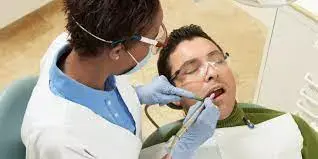- Home
- Medical news & Guidelines
- Anesthesiology
- Cardiology and CTVS
- Critical Care
- Dentistry
- Dermatology
- Diabetes and Endocrinology
- ENT
- Gastroenterology
- Medicine
- Nephrology
- Neurology
- Obstretics-Gynaecology
- Oncology
- Ophthalmology
- Orthopaedics
- Pediatrics-Neonatology
- Psychiatry
- Pulmonology
- Radiology
- Surgery
- Urology
- Laboratory Medicine
- Diet
- Nursing
- Paramedical
- Physiotherapy
- Health news
- Fact Check
- Bone Health Fact Check
- Brain Health Fact Check
- Cancer Related Fact Check
- Child Care Fact Check
- Dental and oral health fact check
- Diabetes and metabolic health fact check
- Diet and Nutrition Fact Check
- Eye and ENT Care Fact Check
- Fitness fact check
- Gut health fact check
- Heart health fact check
- Kidney health fact check
- Medical education fact check
- Men's health fact check
- Respiratory fact check
- Skin and hair care fact check
- Vaccine and Immunization fact check
- Women's health fact check
- AYUSH
- State News
- Andaman and Nicobar Islands
- Andhra Pradesh
- Arunachal Pradesh
- Assam
- Bihar
- Chandigarh
- Chattisgarh
- Dadra and Nagar Haveli
- Daman and Diu
- Delhi
- Goa
- Gujarat
- Haryana
- Himachal Pradesh
- Jammu & Kashmir
- Jharkhand
- Karnataka
- Kerala
- Ladakh
- Lakshadweep
- Madhya Pradesh
- Maharashtra
- Manipur
- Meghalaya
- Mizoram
- Nagaland
- Odisha
- Puducherry
- Punjab
- Rajasthan
- Sikkim
- Tamil Nadu
- Telangana
- Tripura
- Uttar Pradesh
- Uttrakhand
- West Bengal
- Medical Education
- Industry
Ultrasound-guided peripheral IV cannulation effective in patients with difficult IV access

The application of ultrasound-guided peripheral intravenous cannulation should be considered for patients with difficult intravenous access (DIVA) who require intravenous dental sedation or other common procedures in dental surgery that involve cannulation, according to a recent study published in the British Dental Journal.
Dental surgeons regularly provide intravenous dental sedation and oral/transmucosal sedation, which involves cannulation. Cannulation is an essential skill that dental surgeons should be competent to perform, but certain patient groups may be difficult to cannulate.
IV sedation dentistry is the deepest form of conscious sedation available in a dental office setting. Your healthcare provider delivers sedative medications directly to your bloodstream through an IV line. During your procedure, your dentist monitors your heart rate, blood pressure and oxygen levels. IV sedation works quickly, with most people falling asleep in roughly 15 to 30 minutes after it's been administered. Once the IV sedation is removed, you will begin to wake up in about 20 minutes and be fully recovered from all sedative effects within six hours. Ultrasound-guided peripheral intravenous cannulation is an evidence-based technique already used in radiology, emergency medicine, and anaesthesia. Ultrasound-guided peripheral intravenous cannulation has been shown to reduce complications and significantly increase the success of cannulation in patients with difficult intravenous access (DIVA); it may also be preferable in certain special care patient groups.
Thus, the researchers concluded that the application of ultrasound-guided peripheral intravenous cannulation should be considered for patients with DIVA who require intravenous dental sedation or other common procedures in dental surgery that involve cannulation.
To summarize the study:
- Discusses the potential future changes to the provision of dental sedation.
- Discusses possible indications and contraindications of USG-PIVC for intravenous dental sedation.
- Describes the method of USG-PIVC and current barriers to implementing USG-PIVC for intravenous dental sedation.
Reference:
Ultrasound-guided peripheral intravenous cannulation for patients requiring dental surgery under intravenous dental sedation by Ishfaq Khan et al. published in the British Dental Journal.
DOI
https://doi.org/10.1038/s41415-022-4133-x
Dr. Shravani Dali has completed her BDS from Pravara institute of medical sciences, loni. Following which she extensively worked in the healthcare sector for 2+ years. She has been actively involved in writing blogs in field of health and wellness. Currently she is pursuing her Masters of public health-health administration from Tata institute of social sciences. She can be contacted at editorial@medicaldialogues.in.
Dr Kamal Kant Kohli-MBBS, DTCD- a chest specialist with more than 30 years of practice and a flair for writing clinical articles, Dr Kamal Kant Kohli joined Medical Dialogues as a Chief Editor of Medical News. Besides writing articles, as an editor, he proofreads and verifies all the medical content published on Medical Dialogues including those coming from journals, studies,medical conferences,guidelines etc. Email: drkohli@medicaldialogues.in. Contact no. 011-43720751


